43rd World Chess Solving Championship, Vilnius 2019
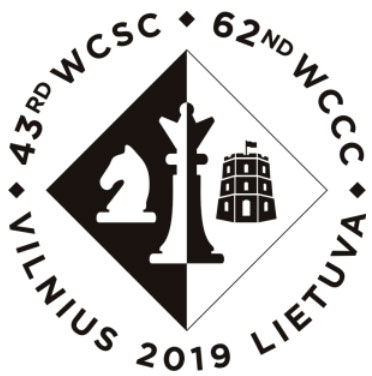
The 43rd World Chess Solving Championship took place during August in Vilnius, the capital of Lithuania. The comfortable and efficiently organized event was held in the Crowne Plaza hotel, which was conveniently situated almost opposite a large park, which provided plenty of chances for walking in between the solving events. In his previous article John Nunn described the course of the event, the winners, and mainly a selection of seven problems that were part of the World Championship without solutions, so our readers could test their own problem solving skills. Were you able to manage?
Today we bring you John Nunn’s description of the solutions and how he was able to find them, finishing a close second in the process. This in spite of the fact that he was, at 64, amongst the oldest participants and was competing in a field of a hundred more youthful solvers.

Top ten in the final results (click or tap to enlarge or download all results)
It is very encouraging to see this result by an old friend who has never ceased to amaze with his intellectual activities. Magnus Carlsen, the current World Champion, agrees: in a 2010 interview with Der Spiegel he was asked about his own IQ and said:
Of course it is important that a chess player can concentrate well, but it can also be a burden if you are too intelligent. It can hinder you. I am convinced that the Englishman John Nunn never became world champion because he is too smart for it. Nunn started studying mathematics at Oxford in 15, he was the youngest student in 500 years and earned his doctorate with 23 in algebraic topology. He has so much in mind. Just too much. His enormous comprehension and constant thirst for knowledge have distracted him from the chess. I am a completely normal guy. My dad is much smarter than me.
Wikipedia quotes Magnus as adding: "He has so incredibly much in his head. Simply too much. His enormous powers of understanding and his constant thirst for knowledge distracted him from chess."
John showed prodigious talent for the game at a very early age. In 1967 he won the British under-14 Championship (at the age of 12), at fourteen the London Under-18 Championship. A year later, at fifteen, he started studying study mathematics at Oriel College in Oxford, becoming Oxford’s youngest undergraduate since Cardinal Wolsey in 1520. John graduated in 1973, he went on to gain his Doctor of Philosophy degree in 1978, remained in Oxford as a mathematics lecturer until 1981. John became a chess grandmaster in 1978 – at the age of 22. He was the British champion in 1980, twice won individual gold medals at Chess Olympiads, and in 1987 took part in the World Chess Championship cycle, narrowly losing a playoff match against Lajos Portisch. He won the prestigious Hoogovens tournament in Wijk aan Zee in 1982, 1990 and 1991 and advanced to the rank of a top-ten player in the world.
John has now retired from regular tournament play and only plays in the occasional Seniors’ event. He had always been a prolific (and highly competent) chess book author and co-founded and for a number of years directed Gambit Publications (see below).
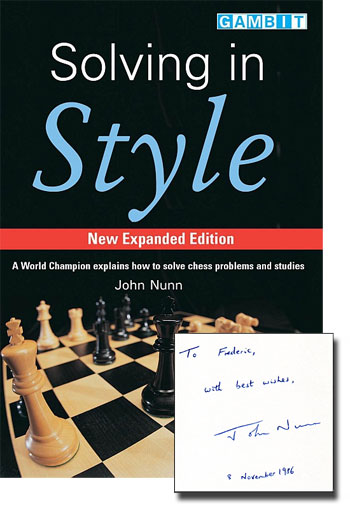 John was always interested in chess problems, composing several unusual examples and taking part in solving contests as part of the British team. in 1985 he wrote a book entitled Solving in Style, which he gave to me a year later, strongly enhancing my interest in the subject. I still have the book and browse in it occasionally, and I am pleased to tell you it is still available.
John was always interested in chess problems, composing several unusual examples and taking part in solving contests as part of the British team. in 1985 he wrote a book entitled Solving in Style, which he gave to me a year later, strongly enhancing my interest in the subject. I still have the book and browse in it occasionally, and I am pleased to tell you it is still available.
In 2004 John won the World Chess Solving Championship in Halkidiki, Greece, and was awarded the title of GM in problem solving – the third person ever to gain both over-the-board and solving GM titles. He won further competitions, e.g. the World Championship in 2007 and 2010.
John has also been interested and involved in computer chess. In the 1980s he joined the editorial board of my magzine Computerschach & Spiele and in 1987 became the first editor of the newly created Chessbase Magazine. In 1992, he released a first book making use of chess endgame tablebases, Secrets Of Rook Endings, later following with Secrets of Minor-Piece Endings, and Secrets Of Pawnless Endings. These books include human-usable endgame strategies found by Nunn (and others) by extensive experimentation with tablebases. John Nunn is thus considered the foremost data miner of chess endgame tablebases.
I owe much of the exact biographical information quoted above to the Wikipedia entry on John Nunn, but would like to mention that John has been a constant visitor in my house since 1983.

All in the family: Nigel Short (really!) and John Nunn playing boules in our garden in Hollenstedt; Helmut Pfleger working on chess in the background. Birgit on the left is now a chemistry PhD who designs the fuel system of Airbus aircraft; Ingrid, on the right, is my longanimous wife who has had to put up with countless chess players in our home.
And I have frequently visited him, in his house in London and later in the suburbs. Most recently we spent a wonderful holiday together in Cornwall. John has also contributed vigorously to the ChessBase News Page over the years. If you are interested to browse around the articles by or about him, here a list on our search page.
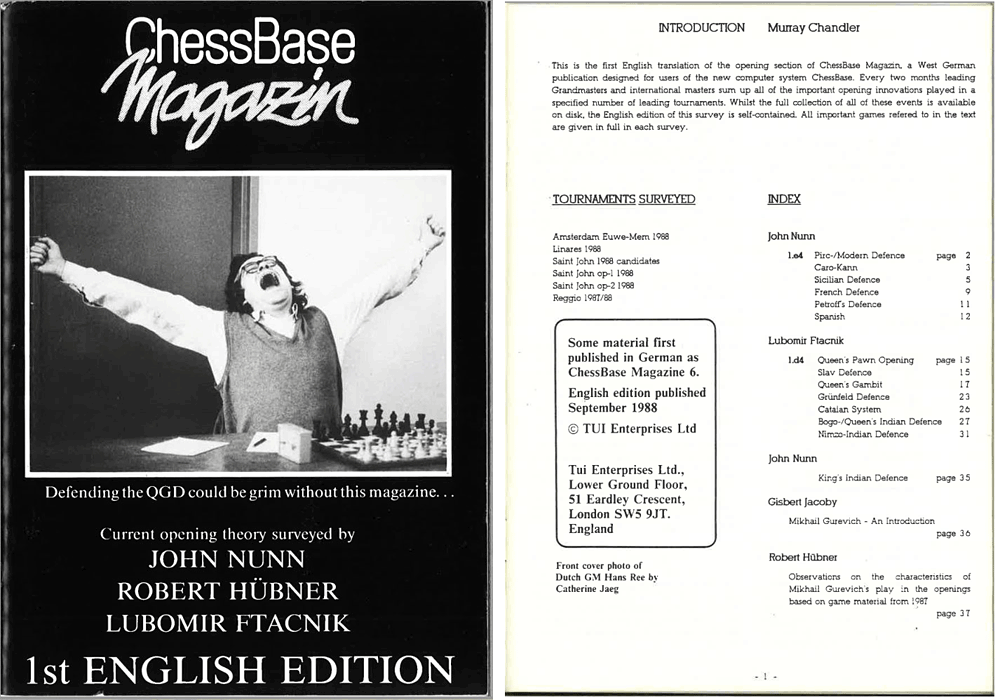
ChessBase Magazine 1/1988 edited by John Nunn (click to enlarge)
But let us come to the solutions of the problems John showed us in his article last month. I urge you to look at his notes on the solving process — and also enjoy the problem positions. This is an art form in itself, part of the Royal Game that was invented over a millennium ago. And there is no-one Nunn better to introduce you to the finer points than John, whose notes you will find in the following annotations.
Replay all solutions
You can analyse with the attached chess engine (fan icon below the board). The engine is not useful in help- or selfmates, but can be used to refute false tries in regular problems.
 Winton is the long-standing sponsor of the British Chess Problem Society, which organizes the Winton British Chess Solving Championship each year. A research-based investment management company, Winton has a singular focus on statistical and mathematical inference in financial markets. Founded in 1997 by its CEO David Harding, the firm now manages approximately $20 billion of assets for many of the world’s largest pension funds, sovereign wealth funds, banks and fund platforms. Working at Winton appeals to highly numerate people who love puzzles and challenges.
Winton is the long-standing sponsor of the British Chess Problem Society, which organizes the Winton British Chess Solving Championship each year. A research-based investment management company, Winton has a singular focus on statistical and mathematical inference in financial markets. Founded in 1997 by its CEO David Harding, the firm now manages approximately $20 billion of assets for many of the world’s largest pension funds, sovereign wealth funds, banks and fund platforms. Working at Winton appeals to highly numerate people who love puzzles and challenges.
If you would like to find out more about chess problems, then check out the website of the British Chess Problem Society.
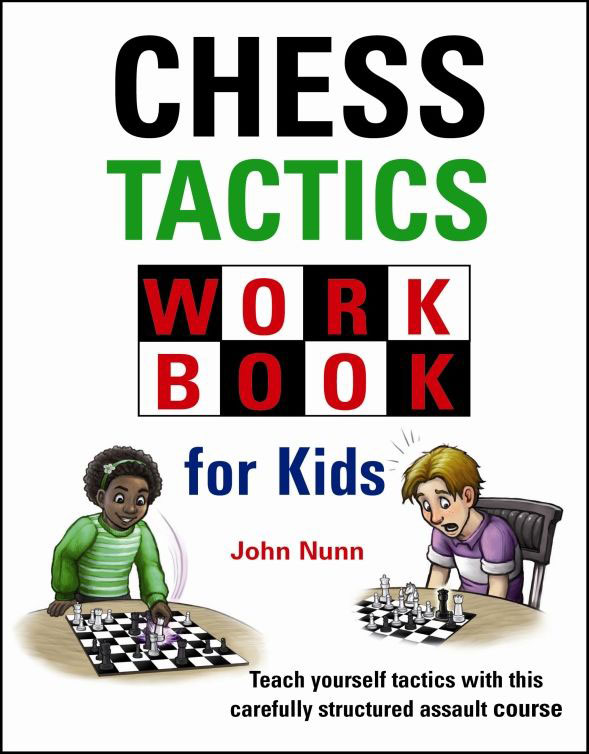 John Nunn has recently published Chess Tactics Workbook for Kids, his first book since John Nunn’s Chess Course back in 2014. It’s his first book aimed specifically at a youth audience and is a far cry from his books for more advanced players. It contains over 400 tactical exercises, starting from the most elementary. A pdf sample may be downloaded here.
John Nunn has recently published Chess Tactics Workbook for Kids, his first book since John Nunn’s Chess Course back in 2014. It’s his first book aimed specifically at a youth audience and is a far cry from his books for more advanced players. It contains over 400 tactical exercises, starting from the most elementary. A pdf sample may be downloaded here.
The printed version can be obtained from a wide range of retailers, including Amazon (here in the UK and here in the US).
In addition to the printed book, there is a Kindle version (available here in the UK and here in the US) and a version for Gambit’s Chess Studio app.

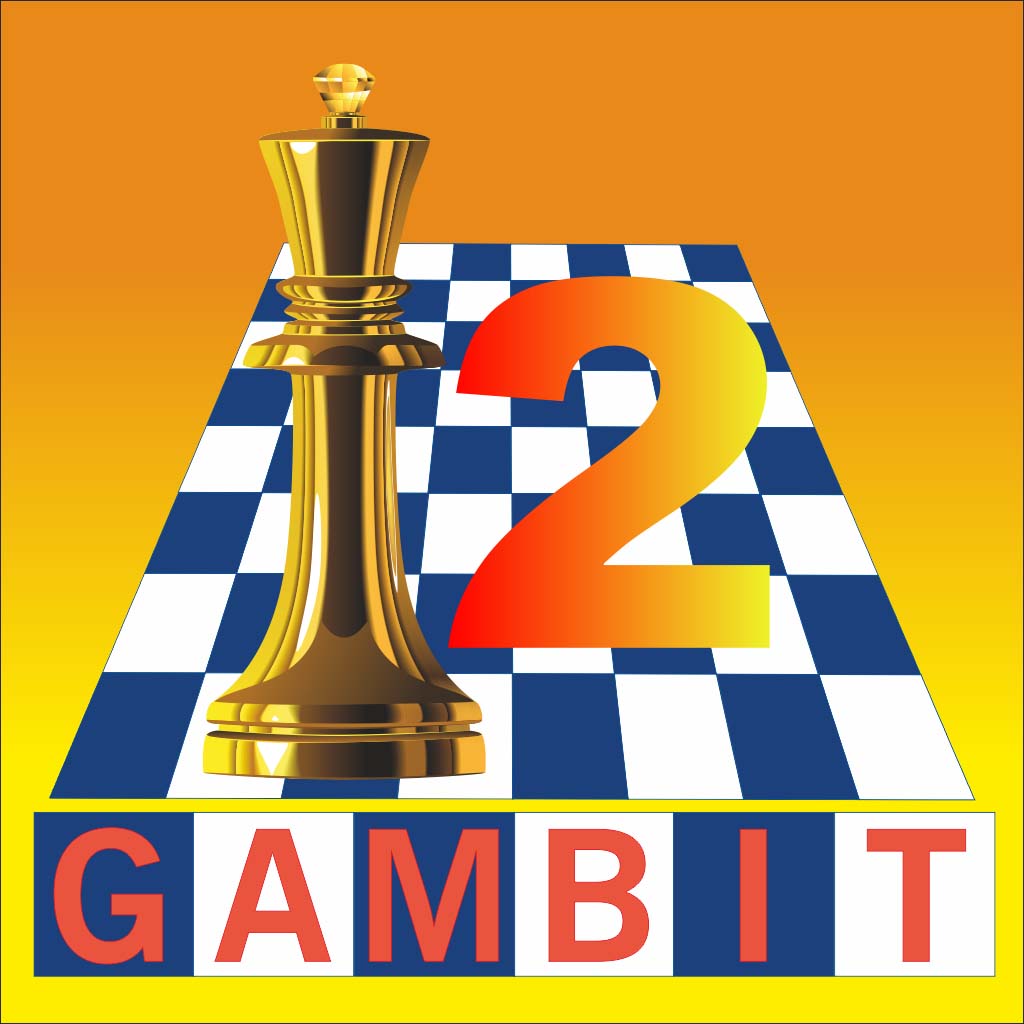 All new books from Gambit Publications are available immediately on the Chess Studio app, available for Apple and Android devices, together with more than 100 backlist titles, and over 20 in German language. You don’t need a set or board – see all the positions and play all the moves just by tapping on the screen. The app is free – try before you buy! The books available are suitable for all ages and cover all aspects of chess – openings, tactics, strategy, endgames and more. They range from our bestselling kids books to specialist titles for experts and masters. Prices range from $4.99 to $14.99, and once you’ve bought a book, you can read it on all your compatible devices. A whole chess library in the palm of your hand!
All new books from Gambit Publications are available immediately on the Chess Studio app, available for Apple and Android devices, together with more than 100 backlist titles, and over 20 in German language. You don’t need a set or board – see all the positions and play all the moves just by tapping on the screen. The app is free – try before you buy! The books available are suitable for all ages and cover all aspects of chess – openings, tactics, strategy, endgames and more. They range from our bestselling kids books to specialist titles for experts and masters. Prices range from $4.99 to $14.99, and once you’ve bought a book, you can read it on all your compatible devices. A whole chess library in the palm of your hand!
More information about Gambit Chess Studio 2:
.jpeg)



















 John was always interested in chess problems, composing several unusual examples and taking part in solving contests as part of the British team. in 1985 he wrote a book entitled Solving in Style, which he gave to me a year later, strongly enhancing my interest in the subject. I still have the book and browse in it occasionally, and I am pleased to tell you it is
John was always interested in chess problems, composing several unusual examples and taking part in solving contests as part of the British team. in 1985 he wrote a book entitled Solving in Style, which he gave to me a year later, strongly enhancing my interest in the subject. I still have the book and browse in it occasionally, and I am pleased to tell you it is 

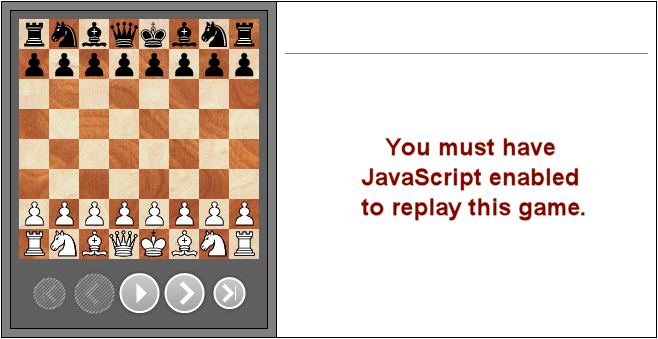

 John Nunn has recently published Chess Tactics Workbook for Kids, his first book since John Nunn’s Chess Course back in 2014. It’s his first book aimed specifically at a youth audience and is a far cry from his books for more advanced players. It contains over 400 tactical exercises, starting from the most elementary. A pdf sample may be downloaded
John Nunn has recently published Chess Tactics Workbook for Kids, his first book since John Nunn’s Chess Course back in 2014. It’s his first book aimed specifically at a youth audience and is a far cry from his books for more advanced players. It contains over 400 tactical exercises, starting from the most elementary. A pdf sample may be downloaded  All new books from
All new books from 




